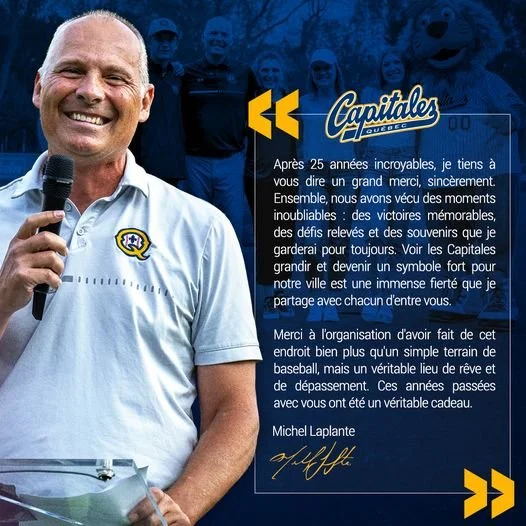Verge: Laplante moving on after establishing championship-winning culture with Capitales
After securing his third consecutive championship with the Quebec Capitales, team president Michel Laplante has decided to step away from the club. Photo: Quebec Capitales
December 3, 2024
By Melissa Verge
Canadian Baseball Network
He developed it. He supported it. He helped it flourish.
And in October, Michel Laplante said goodbye to his Quebec Capitales, an organization that has been near and dear to the 54-year-old for 25 years.
Who the Capitales are - the winning culture, the sense of family the organization embodies, the relaxed atmosphere. That’s largely been created by LaPlante, who has been front and center with the Capitales since he was 29-years-old.
It’s always challenging to have success in independent baseball, but Laplante helped them achieve that, Miles Wolff said, who founded the team, and is also the former owner of Baseball America.
“Michel has just made it so successful,” Wolff said. “It’s just an amazing career, an amazing effect he’s had on baseball in the city.”
He was there from the beginning to help pick out the team colours, hired on by Wolff after a life-changing dinner.
Wolff was looking for a francophone to help get things started in Quebec, after the idea for bringing a professional franchise to Quebec was first put on his radar by André Lachance and Jean-François Côté. Wolff believed Laplante, then playing in the Northern League in Wisconsin - a league that Wolff founded - would make magic happen with the team.
According to Laplante, Wolff said, “I know you speak French, you’re from Quebec, I want to start a team next year in Quebec City. Would you be willing to start it with me?”
Laplante said yes, and he joined the team in a double role - helping out in the front office in the off-season, and as a player during the regular season.
In 25 years, Laplante has helped develop the culture in Quebec into something beautiful. He was an integral part of the team, and he knew the organization inside out, having been everything, from a player, a coach, a manager, a co-owner and most recently, president.
He helped make it a family environment, relaxed, run by a man who was as genuine as they come, said Sebastien Boucher, who had his number retired by the Capitales earlier this year. Laplante always believed if players were enjoying themselves and happy, they were going to perform that much better.
“He just brought that energy in a way that was great for the success of the club,” Boucher said, who ranked second all-time for the Capitales in career batting average (.319) RBI (327) and triples (12).
That culture is still evident today, said pitcher James Bradwell, who suited up for the Capitales this past season in Quebec.
It was a special environment compared to any team he has been on before, Bradwell said.
“As soon as you step in the clubhouse [you feel] like you're a part of that history, of Canadian and Quebecois baseball that’s been so successful as of late,” Bradwell said.
But it was always temporary, and with his team in a good spot, having just won it all in three years in a row, Laplante thought it was a good time to step away.
With a more flexible schedule, he can focus on bringing the success he’s brought to the Capitales, elsewhere in the province.
His next project?
Montreal.
Stepping away will open the door for new opportunities to grow the game in his home province. One of Laplante’s priorities is bringing a multi-sport facility to Montreal that functions for baseball as well as other sports.
“I would like to finish my time at Baseball Quebec saying ‘You know what? We did it,’” Laplante said of the multi-sport facility.
Laplante’s lengthy and successful journey in baseball all started with an unexpected knock on the door at 7 a.m.
It carried some of the best news he had ever received. It was the summer of 1992 and he was playing in the Intercounty Baseball League in Stratford, Ontario. The 22-year-old was living in a little house with other players, all gunning after the same dream.
The knock changed everything. It was one of his teammates coming to tell him he’d been drafted.
“I’m trying to find out who the hell drafts me and what was the deal,” Laplante said, who was only playing for three years when he got the offer.
But it was legit, and one of the best days of his life (after his three kids, of course.) $7,500, new cleats, and a new glove, to join the Pittsburgh Pirates’ organization.
Forget the money. “I’m like ‘holy shit, I’m going to have new spikes and a new glove,’” he said.
He signed the contract.
His natural talent had him drafted with just three years experience, while others had a decade or more. After eight years and a few trades, he made it all the way to triple-A with the Atlanta Braves in 2000, before an injury ended his playing career.
While others would’ve been devastated, Laplante, from Val-d’Or, Quebec, was enlightened. His time playing baseball was always looked at by him not to necessarily make it to the show, but as the opportunity to grow, to learn English, to travel the world.
And that’s what he did, eventually finding his home with the Capitales.
Before his success and the success of the team, there were people who said Laplante couldn’t, he shouldn’t, it wouldn’t work out, all throughout his career in baseball. If he had listened, instead of following his heart, the impact he’s had on the sport in Quebec and across the country would have never happened.
When he took a risk and first moved to Montreal from his hometown of Val d’Or in 1991 to be part of the ABC (Académie de baseball du Canada) the skeptics spoke loudly. And again when he started up his now successful baseball bat company in the early 2000’s, B45, that manufactures yellow birch baseball bats, the doubters said he couldn’t do it.
But then there was Bob Bissonnette, a co-owner of the Quebec Capitales alongside Laplante, who also worked as general manager of B45.
Someone else’s “you shouldn’t,” was Bissonnette’s “let’s do it.”
They were two dreamers, kindred spirits, both working in Canadian baseball.
What could happen in life when you don’t set limits? When you have something you believe in, and now, someone who believes in you?
Magic.
The dome they installed back in 2017 at Canac Stadium, that made it usable year round, a multi-sport facility, Bissonnette had a part in, Laplante said.
“It was a little bit of Bob behind it just whispering in my ear, you know, ‘hey man, you believe in it, do it,’” Laplante said.
It’s a support that extended off the field between the two co-owners.
There was a conversation the two had over dinner one evening. Bissonnette thought he might be able to make a living out of music. He asked Laplante what he thought.
“Screw it bro, do it,” Laplante says. “I mean, if you believe in it, let’s go.”
Bissonnette blew up on YouTube, with more than six million views.
“Let’s do it,” — three simple words of encouragement to each other — led to big accomplishments for both friends.
And those words “let’s do it,” from his late friend will always be with him, Laplante said, of Bissonnette, who passed away in a helicopter crash in Campbellton, N.B. back in 2016, alongside his pilot and friend Frederick Décoste. Laplante was in the helicopter, but survived.
“Let’s do it,” are words Laplante, who has also worked as the vice president of Baseball Quebec for 15 years, will be taking whole heartedly into his next chapter, as he finishes up his time in the Capitales office at the end of December. Following his heart to achieve what others wouldn’t dare to try in the baseball world.
There has to be a little bit of Bissonnette in that, two dreamers from Quebec, going after what they believe in, when others would’ve given up.
“I've always been like, I see something that my heart believes in it, I just go [for it],” Laplante said.
“I think he [Bissonnette) had it [that mindset] as strong as me, if not stronger,” Laplante said, who may have spent 25 years helping develop the sport in the province, but it appears he is just getting started.
And as his late friend Bissonnette would likely say to a facility that can bring a new level of baseball to Montreal?
“Michel? Let’s do it.”



